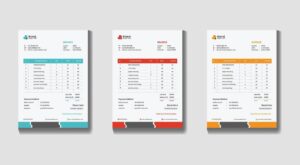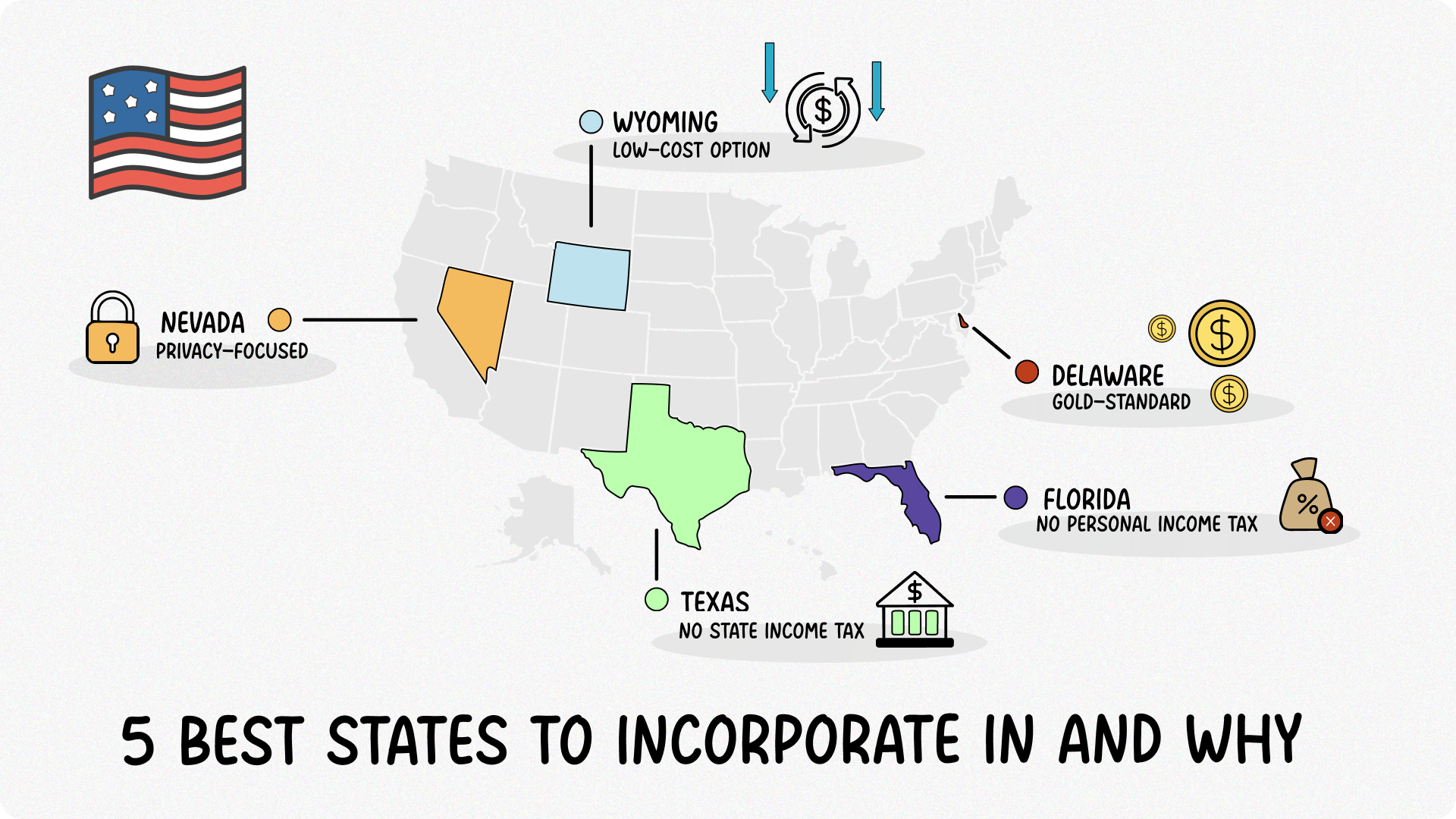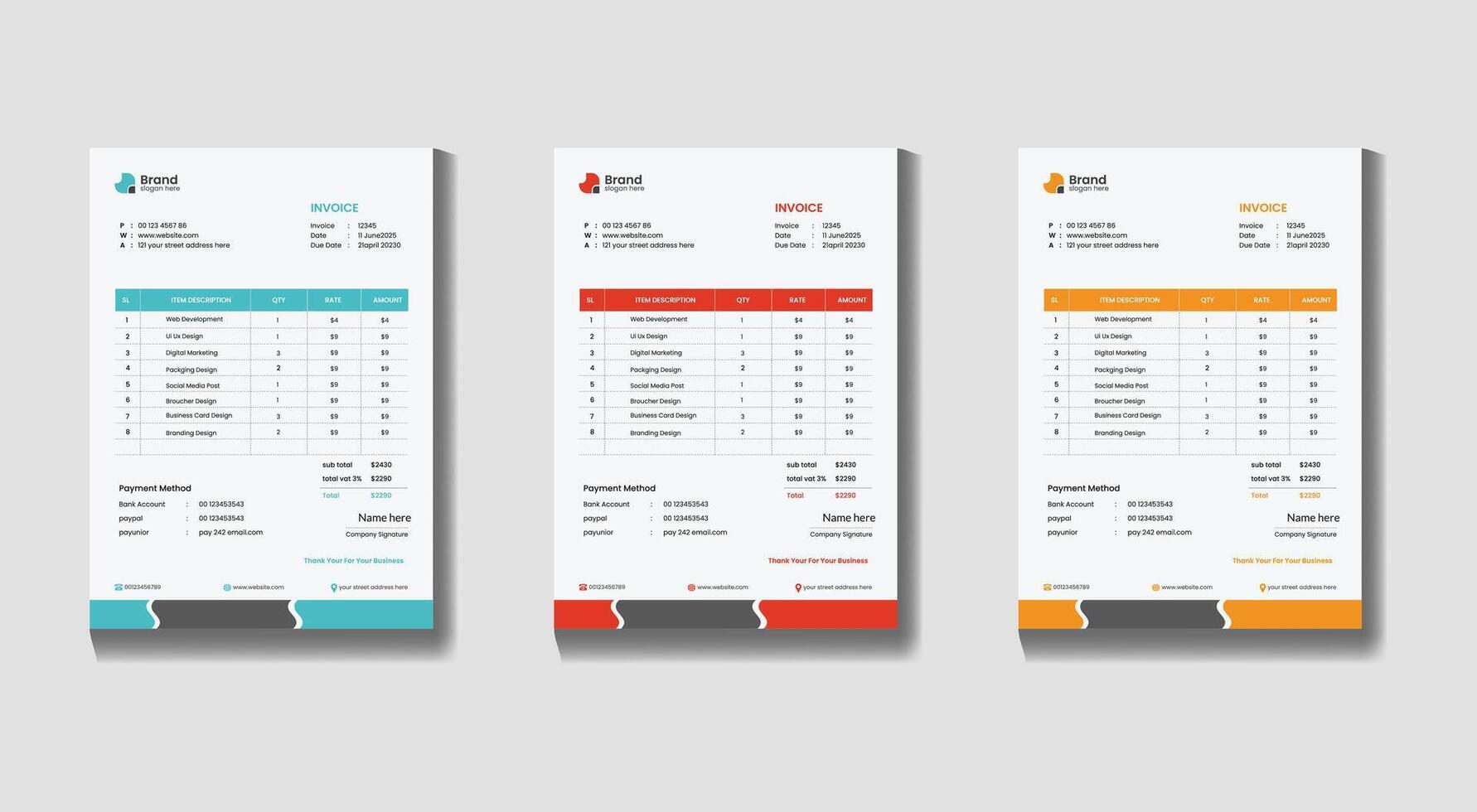When I started my first small business, I remember staring at a blank screen, Googling “where should I incorporate?” I found conflicting advice, fees that seemed to change overnight, and legal jargon that made my head spin. Over time—after a few “oops” moments and some late-night research—I narrowed it down to five states that consistently offer the best mix of low costs, solid legal protections, and friendly environments for entrepreneurs. Here’s what I’ve learned, with real numbers (as of 2025) and a few personal notes about why these states stand out.
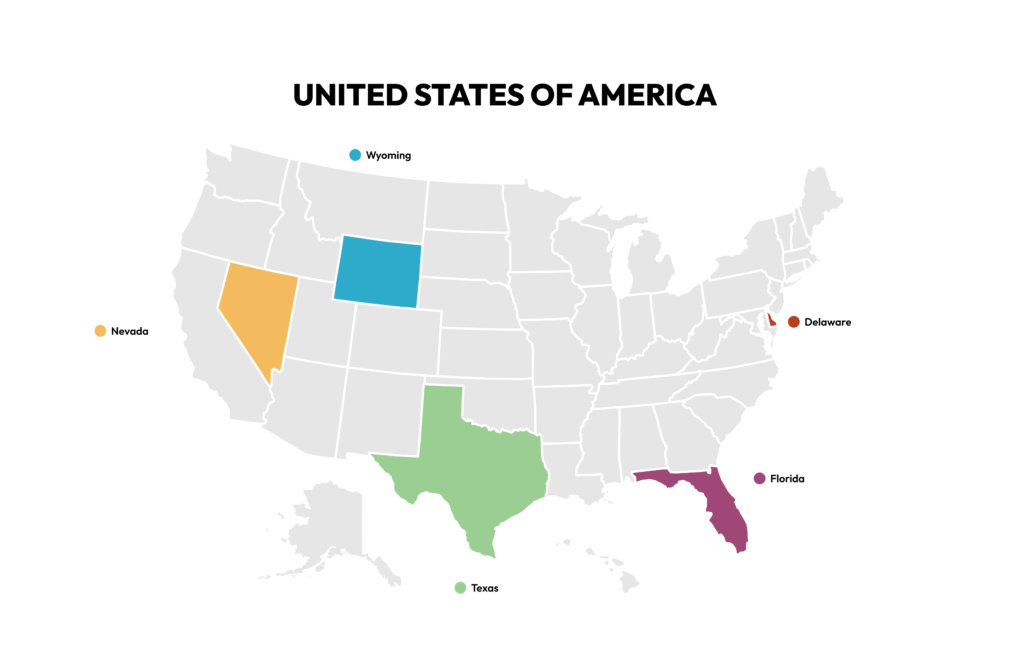
Table of Contents
- Delaware: The Gold Standard for Big (and Small) Businesses
- Wyoming: The Friendly, Low-Cost Option for Small Businesses
- Nevada: Privacy-Focused with No Corporate Income Tax
- Texas: No State Income Tax + Seller’s Market for Services
- Florida: No Personal Income Tax + Moderate Corporate Tax
- TL;DR
- Final Thoughts
- Need Help with Your Accounting?
Delaware: The Gold Standard for Big (and Small) Businesses
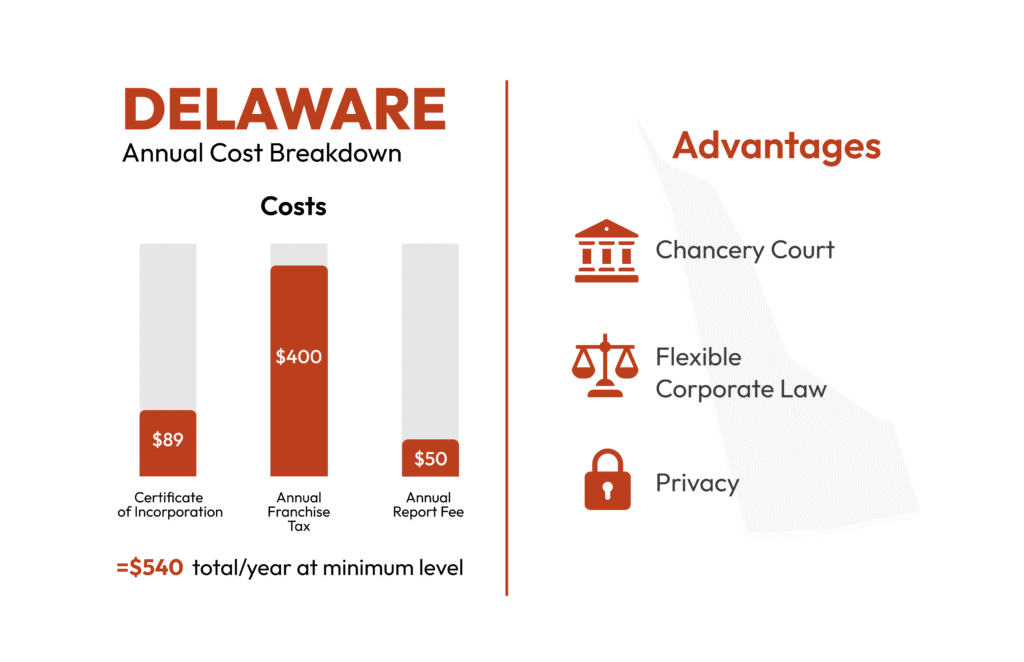
“People joke that Delaware exists just so corporations can incorporate there—and it almost feels that way when you see how slick their system is.”
Why Delaware?
- Chancery Court: Delaware’s Court of Chancery is world-famous. It’s a specialized business court that hears corporate disputes without a jury. Verdicts come faster, and judges are experts in corporate law. For me, knowing there’s a consistent, business-savvy court was a huge comfort when I worried about potential lawsuits down the road.
- Flexible Corporate Laws: Delaware law allows boards to structure nearly any governance arrangement. You can protect minority shareholders, use staggered boards, or issue multiple classes of stock. I once chatted with a friend who had to pivot his startup’s capitalization structure overnight—he said Delaware made it almost painless.
- Privacy: Delaware doesn’t require you to list officers or directors in the public formation documents. That extra layer of anonymity was appealing when I didn’t want my LLC membership roster floating around online.
Fees (2025):
- Certificate of Incorporation (C-Corp): $89 filing fee.
- Annual Franchise Tax: Minimum $400 per year for corporations (calculated by one of two methods—Authorized Shares or Assumed Par Value). Many small startups pay the minimum.
- Annual Report: $50.
If you budget about $540/year (minimum franchise tax + report), you’re covered. And if your business grows—say, you issue more shares or have a high par-value capital structure—you might pay more, but startups typically stay at the minimum.
Personal note: My first LLC wasn’t in Delaware—it was in my home state. But after attending a startup accelerator and hearing investors talk about “Delaware C-Corp, please,” I re-formed there. I still recall breathing a sigh of relief when I realized investors are so comfortable with Delaware entities that legal due diligence becomes that much smoother.
Wyoming: The Friendly, Low-Cost Option for Small Businesses
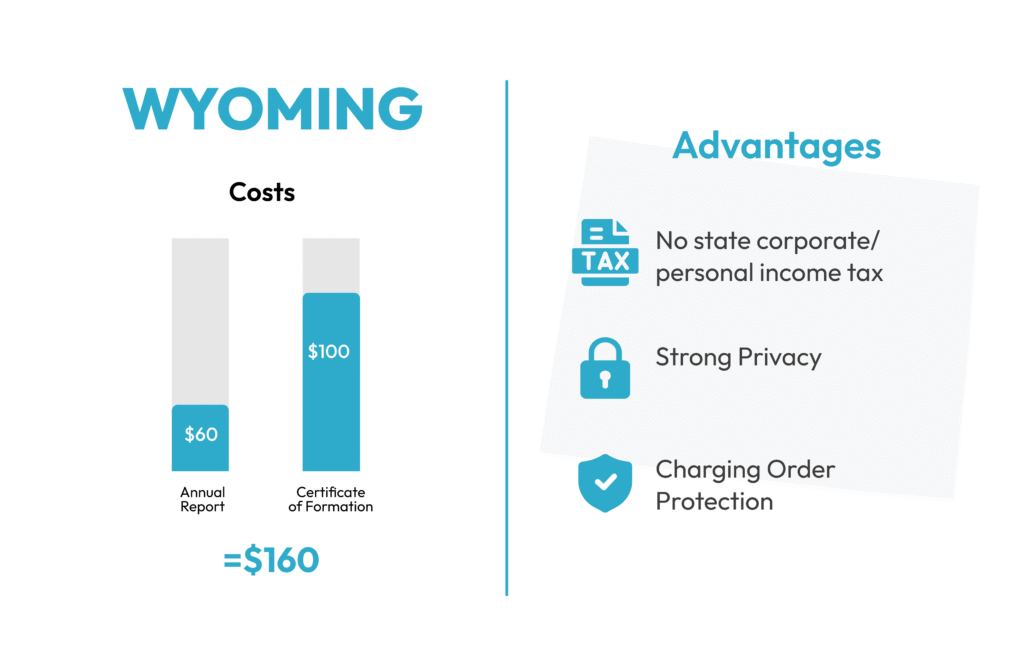
“Think of Wyoming as the underdog—no one talks about it as much as Delaware, but it quietly checks all the right boxes for a lean, mean small-business machine.”
Why Wyoming?
- Low Fees:
- Certificate of Formation (LLC): $100 flat fee.
- Annual Report Fee: $60 minimum (0.0002 of assets located in Wyoming). In practice, most small LLCs pay exactly $60.
- No State Corporate Income Tax: Wyoming has no corporate income tax, no personal income tax, and no franchise taxes. That simplicity saved me about $500 one year when I was projecting revenue and realized state taxes would have eaten into my slim margins.
- Strong Privacy Protections: You don’t have to list members or managers publicly—only the organizer on your initial filing.
- Asset Protection: Wyoming has some of the strongest “charging order” protections in the country. If someone sues your LLC, they generally can’t seize membership interests; they can only get distributions if the court grants a charging order. That detail gave me peace of mind before I was even making revenue.
Personal note: When I was a freelancer, I formed a single-member Wyoming LLC just because the yearly cost was so low. It felt thrilling to pay only $160 total each year and know my personal assets had a legal buffer.
Nevada: Privacy-Focused with No Corporate Income Tax
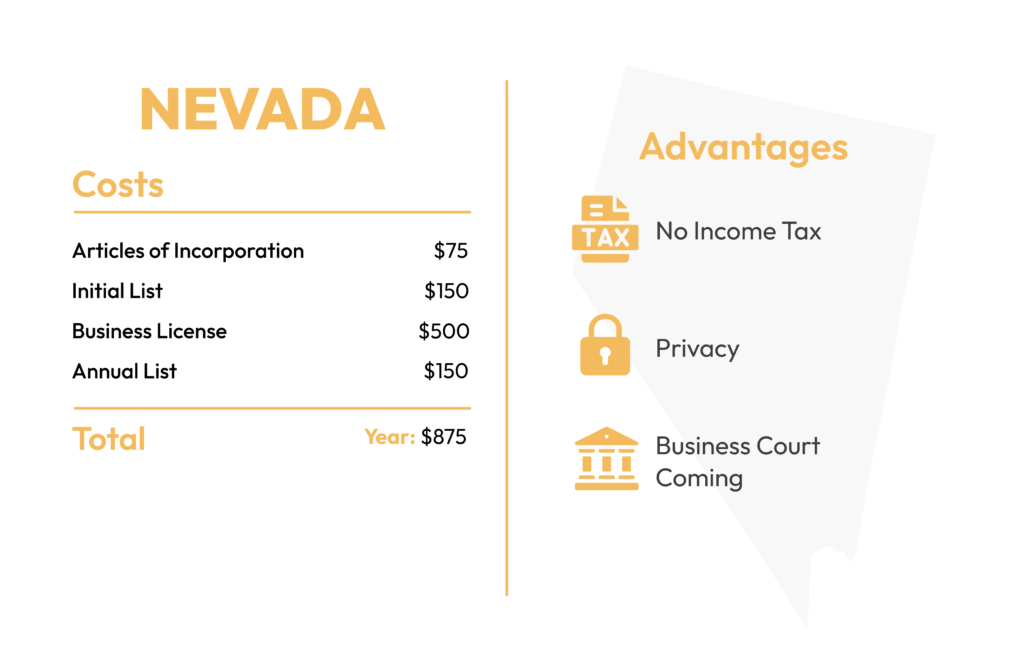
“Nevada is like Wyoming’s more opulent cousin—privacy protections, no state income tax, and a reputation as the ‘Florida of the West’ for tax benefits.”
Why Nevada?
- No State Corporate or Personal Income Tax: Nevada levies no corporate income tax, no franchise tax, and no personal income tax. Running payroll (if you hire employees) means you’re on the hook for federal payroll taxes only.
- Strong Privacy:
- You don’t need to disclose officers or directors on the Articles of Incorporation.
- Shareholder lists remain private.
- Business-Court System Coming Soon: In 2024, Nevada passed legislation to create its own business court (similar to Delaware’s Chancery Court). Though it won’t be fully operational until 2026, the promise of a fast-track business litigation process is attractive if you anticipate future growth or potential disputes.
Fees (2025):
- Articles of Incorporation (C-Corp): $75.
- Initial List of Officers/Directors: $150.
- State Business License (Annual): $500.
- Annual List of Officers/Directors: $150.
In total, expect around $875 in year one (incorporation + list + license). Subsequent years are $650 (license $500 + list $150). I know that sounds steeper than Wyoming, but if privacy and zero state tax on profits matter, many entrepreneurs find Nevada worth the up-front costs.
Personal note: A colleague once told me, “If you live in California but want to keep your taxes honest, move to Nevada for your mental health.” He wasn’t wrong—no state income tax means one fewer headache at tax time.
Texas: No State Income Tax + Seller’s Market for Services
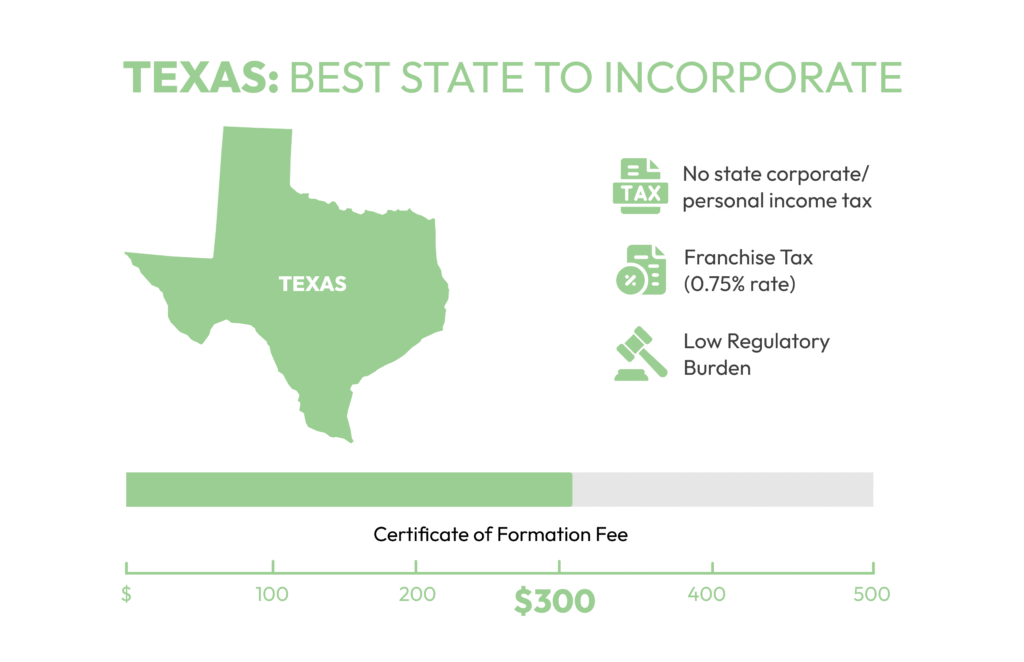
“Texas is booming—no state income tax, a thriving entrepreneurial scene, and a sense of ‘everything’s bigger in Texas,’ including opportunities.”
Why Texas?
- No State Personal Income Tax: Like Wyoming and Nevada, Texas has no personal income tax. That’s a big draw if you’re planning on paying yourself a significant salary.
- Franchise Tax (Margin Tax):
- Rate: 0.375% for wholesale and manufacturing, 0.75% for other businesses.
- No Tax If Revenue < $1.23 million (2025 threshold). If you’re a small outfit just starting, you might never see a franchise tax bill until you cross that threshold.
- Certificate of Formation Fee: $300 (one of the higher initial filing fees).
- Chamber of Commerce/Networking: Major metros like Austin, Houston, and Dallas have vibrant tech and startup communities. If you love in-person networking (I do), Texas can feel electric.
- Regulatory Environment: Texas is often ranked among the top 10 business-friendly states by organizations like the Tax Foundation. That means fewer red tape headaches.
Personal note: I once thought I’d set up shop in California, but I cringed at that 13.3% top-bracket personal rate on top of corporate taxes. Texas felt like a breath of fresh air—zero state income tax, and Austin’s startup vibe makes you feel like anything’s possible.
Florida: No Personal Income Tax + Moderate Corporate Tax
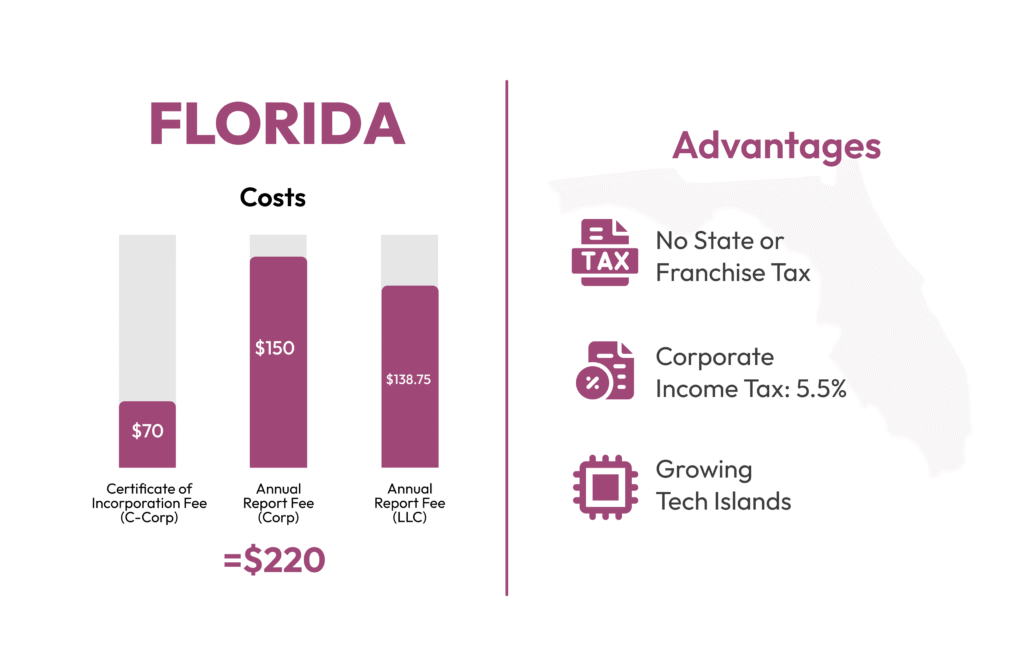
“Florida is that friend who loves to chill in flip-flops but still knows how to hustle—no personal income tax, solid consumer market, and a growing tech ecosystem.”
Why Florida?
- No State Personal Income Tax: You keep more of what you earn. Even if you pay yourself a salary as an S-Corp owner, you won’t owe state income tax.
- Corporate Income Tax: 5.5% flat rate (effective rate is slightly lower after credits). If you’re comparing to Delaware’s 21% or other states’ higher rates, 5.5% is competitive.
- Certificate of Incorporation Fee (C-Corp): $70.
- Annual Report Fee: $150 for corporations, $138.75 for LLCs.
- No Franchise Tax: Florida has no franchise tax on net worth or capital stock—only the 5.5% corporate income tax.
- Growing Tech Islands: Tampa, Miami, and Orlando are all building strong tech hubs. If you like mixing beach time with board meetings, Florida fits the bill.
Personal note: I spent a summer in Miami Beach brainstorming a business plan on the sand. The idea of paying zero state income tax gave me the energy to work late nights—and if you’ve ever tried running spreadsheets in 90-degree heat, trust me, you’ll appreciate anything that saves you a percentage point of tax.
Things to Consider When Choosing a State
- Cost Sensitivity:
- If low yearly fees are your top priority (e.g., you’re bootstrapping a side hustle), Wyoming is hard to beat.
- If you don’t mind paying a few hundred dollars and want strong privacy, Nevada is appealing.
- Growth & Investment Plans:
- If you plan to raise venture capital or aim for a public offering someday, Delaware is still the gold standard—investors know and love Delaware C-Corps.
- If you’re scaling in a specific region, like the Texas tech corridor, Texas can give you local credibility.
- Tax Strategy:
- No personal income tax: Wyoming, Nevada, Texas, Florida.
- No corporate income tax: Wyoming, Nevada, Texas.
- If you expect to keep profits in the company (rather than distribute), consider states with no franchise or capital-stock taxes (Wyoming and Nevada shine here).
- Simplicity vs. Support:
- Simplicity: Wyoming’s straightforward fees and minimal reporting are perfect if you want “set it and forget it.”
- Support: Delaware and Texas offer a wealth of legal precedents, dedicated courts or resources, and vibrant business communities.
TL;DR
A quick overview of the five best states to incorporate in, plus why they might be a fit for you:
| State | Formation Fee | Annual Cost | Corporate Tax | Personal Tax | Key Benefits |
| Delaware | $89 (C-Corp) | $400 franchise tax + $50 report | None on C-Corp profits | None on pass-through | – Chancery Court – Flexible corporate laws – Investor-friendly |
| Wyoming | $100 (LLC) | $60 annual report | None | None | – Lowest fees – Strong privacy & asset protection – No state income tax |
| Nevada | $75 (C-Corp) | $500 business license + $150 list | None | None | – Robust privacy – No corporate/personal income tax – Business court by 2026 |
| Texas | $300 (Corp) | Exempt under $1.23M revenue; otherwise 0.375%–0.75% margin tax | 0.375%–0.75% (varies) | None | – No personal income tax – Large business ecosystem – Franchise tax exemption under $1.23M |
| Florida | $70 (C-Corp) | $150 annual report | 5.5% | None | – No personal income tax – Growing tech hubs – Moderate corporate tax |
Final Thoughts
There’s no one-size-fits-all “best state”—it really depends on your budget, growth plans, and tolerance for paperwork. When I first started, the difference between $60/year (Wyoming) and $540/year (Delaware) felt huge. But as my business matured and I talked to investors, it became clear that Delaware could save me weeks of legal back-and-forth. Meanwhile, friends who run lean e-commerce stores from home still swear by their $160/year Wyoming LLCs.
In the end, pick the state that aligns with your current priorities: cost, privacy, investor confidence, or community. And remember, you can always form in one state and later register as a foreign entity in another (it’s called “qualifying” to do business in your home state). That’s exactly what many growth-stage startups do: incorporate in Delaware, then register in their home state so they can open a bank account, hire W-2 employees, and sign leases without legal headaches.
I hope this guide helps you sleep a little easier as you choose your business’s “home.” Wherever you decide to incorporate, know that every entrepreneur—myself included— started exactly where you are right now: staring at a blank filing form, hoping they made the right choice.
Need Help with Your Accounting?
At Fynlo, we know every state has its own quirks—whether it’s Delaware’s Chancery Court, Wyoming’s low fees, Nevada’s privacy rules, Texas’s franchise tax, or Florida’s corporate rate. Our expert team can handle your bookkeeping, annual filings, and state-specific tax planning no matter where you incorporate. Schedule a call today, and let us make sure your business stays compliant and financially healthy, from formation through growth.
You may also like these articles:
